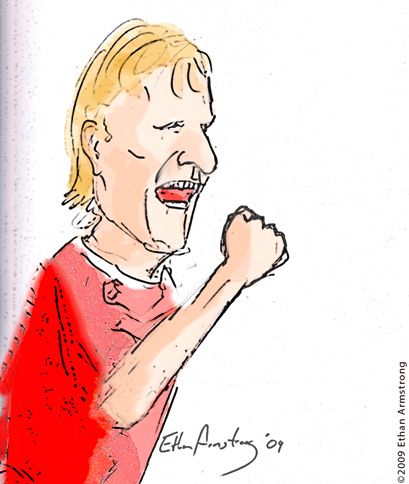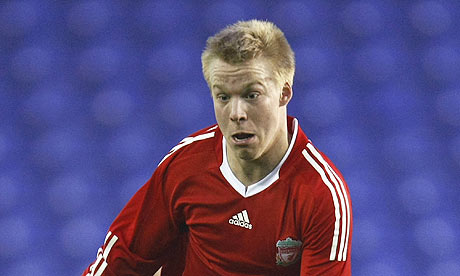The news that Kenny Dalglish may return, in some capacity, to Liverpool is almost too good to be true. Quite simply, the timing could not be better.
Dalglish’s presence may have undermined previous managers, but Rafa Benítez now has the strength of position to have someone like the legendary no.7 onboard without it causing an imbalance of power. It is an appointment to make when on the rise, not when in disarray.
I think it’s clear that Kenny’s management days are behind him. In my first book, Golden Past, Red Future, I was a little critical of Dalglish as a boss; not necessarily from his time at Liverpool, but how he, along with managers like George Graham, Graham Taylor and Howard Wilkinson, struggled after the influx of continental players and managers, from the mid-’90s onwards. He seemed a bit of a yesterday’s man in the new era.
Looking back, I’m not sure I agree with those assertions; at least regarding Dalglish. (For Taylor, Graham and Wilkinson, it still rings true.)
When writing Dynasty, I looked into Kenny’s career after leaving Liverpool, and realised just how many good players he bought as Newcastle manager –– such as Shay Given, Nolberto Solano, Gary Speed and Didi Hamann –– as he looked to put some steel into the exciting but fragile side Keegan had assembled. He also came close to winning a trophy, losing the 1998 FA Cup Final to Arsenal, albeit after a 13th-placed league finish (having guided Newcastle to 2nd in his first half-a-season on Tyneside).
Indeed, his tactics at Newcastle were actually very modern: trying to create an organised side that could defend, from which to spring forward. The problem was as much to do with Newcastle fans’ impatience, and their desire for ‘sexy’ football; problems that haunt them to this day, as they lurch from one appointment to another, craving winning football with style, when to start with, any kind of winning football should be enough.
Dalglish was seen as dour, when in truth he was merely setting some foundations, at a club where Kevin Keegan had abandoned such principles (including abolishing the reserves, which now seems like a dereliction of duty).
So I feel I was wrong to use Dalglish’s failure at St James’ Park as an example of the ‘old guard’ having become extinct. The dinosaurs did die out, but he was not necessarily one of them.
I also thought his success at Blackburn was somewhat ‘bought’ (albeit well bought!), and that, allied to the fact that he inherited a world-class side at Liverpool, a few doubts were left in my mind as to whether he was right up there with the very best of the best.
However, in the detailed analysis I’m undertaking for my new book, Red Race, I’ve reassessed his time at Ewood Park as part of a detailed study of success in the Premiership era; I’ll save the details for the time of release, but suffice to say that it now looks far less like a ‘bought’ title to me, and yet another case of media misconceptions.
I do think Dalglish left an imbalanced squad when he resigned from Liverpool, and this is a criticism made in Dynasty that I feel abides. In his final season, the average age of his strongest XI was 30, some 2.5 years older than any other managers’ best team. And that didn’t include Alan Hansen, 36, who was about to retire. It was side heading rapidly over the hill.
Of course, Kenny had personally tempted a young Robbie Fowler to Liverpool, while Steve McManaman and Jamie Redknapp were about to make the breakthrough, as was the underrated Mike Marsh. Steve Staunton was also only 22 at the time.
But the quality of the majority of his signings after Hillsborough were the exact opposite of those made before the tragedy, and that reinforced the notion, backed up by physical symptoms (such as a serious rash), that he needed a break.
If the pressure to win trophies was immense beforehand, Hillsborough probably added even more weight: the desire to win things for those who perished. If anything, Hillsborough showed the staff just how important the club is to its fans. Rather than show that football wasn’t important, it paradoxically proved that, to the lives of many, it is the thing that gives greatest joy, outside of their families.
So I don’t think Dalglish’s time as a manager was flawless. Having said that, he won a greater percentage of games than any other Liverpool manager, and built the most exciting Liverpool team: the sublime 1987/88 side. While he’d inherited a great side, he certainly put his own stamp on it in that vintage season. And to come back and win the league again, with Blackburn, with very different tactics, shows the quality of the man.
It’s also true that I have objected to the fans who, in recent years, have called for Dalglish to manage the Reds again; I felt that the game had moved on, and that he’d been out of the loop for too long, making it too much of a risk. A decade is a long, long time in football, and in terms of leading a club, it’s important to look to the future, not the past.
That didn’t stop Dalglish being a great football thinker, because that was never in doubt, but it did mean not continually harking back to the past in order to move forward. And I always felt that Benítez was the right man; however, now the time seems right to bring back someone who symbolises success, as an ally. It is the kind of appointment that a manager has to sanction, aware that the two men can work together.
I’ve actually long-since felt that King Kenny should be a figurehead at the club. In truth, I always envisaged an ambassadorial role similar to Bobby Charlton at Manchester United, but it would be better still if Kenny were to act as a sounding board for the current manager, on hand to offer advice; Benítez doesn’t need anyone to tell him what to do, but if someone else can help find an extra couple of percent here and there, it could be priceless.
It was an appointment that almost happened under Roy Evans in 1997, but Evans understandably felt that the first run of bad results would lead to calls for Dalglish to replace him; no manager can work under such pressure. Evans was a great club man for Liverpool, but he didn’t have the managerial cachet that Benítez carries.
Now that Benítez is in a position of strength, it makes sense to get the club’s greatest figure working on his, and its, behalf.
In recent years my admiration for Dalglish, my boyhood idol, has grown, not least in the way that he has continually preached common sense in defence of Benítez, while other players take the lucre to stick the boot in.
Some ex-players sicken me (some of the stuff Ronnie Whelan has come out with about Rafa in the past year borders on spite), while others, like Alan Hansen, can wind me up at times, but at least try to be fair, and have my enduring respect.
But Dalglish knows just how hard the manager’s job is. He knows what it’s like when, even though his team was still winning the majority of its games (not to mention trophies), his decisions and tactics were continually called into question, as he moved into his final couple of years.
“Too defensive”, “pig-headed in not playing Player X (Peter Beardsley)”, “never keeping the same side”, “never names the side until an hour before kick-off”, and so on.
It only needed zonal marking to sound like a critique of Rafa Benítez. In one game at Highbury, Dalglish fielded three ‘defenders’ in midfield (albeit versatile players). Liverpool won the game. But still he was criticised.
But perhaps the best thing about the appointment, should it happen, relates to a closing of a cycle; things coming full circle.
Twenty years ago Alex Ferguson wanted to “knock Liverpool of their fucking perch”, and now, as he nears retirement, the Reds are emerging as a real threat, with a young, rapidly improving side. I don’t see any great chinks in United’s armour, but it is they, as reigning champions (and in Ferguson’s case, one obsessed with Liverpool), who have the most to lose.
Kenny Dalglish is the only man to consistency eclipse Ferguson during his time as a manager. Ferguson didn’t get near Dalglish when he was in charge at Anfield, and when Kenny came back with Blackburn, he eventually got the upper hand again, before moving upstairs at Ewood Park with the title in the bag.
Psychologically, it would be a big boost to everyone at Liverpool to see him back, with that vast experience to draw upon, and the stature, to project around Melwood and Anfield, of an ultimate winner symbiotically linked to the club.
Symbolically, it would send out a powerful message: the King is not dead.
Long live the King.









